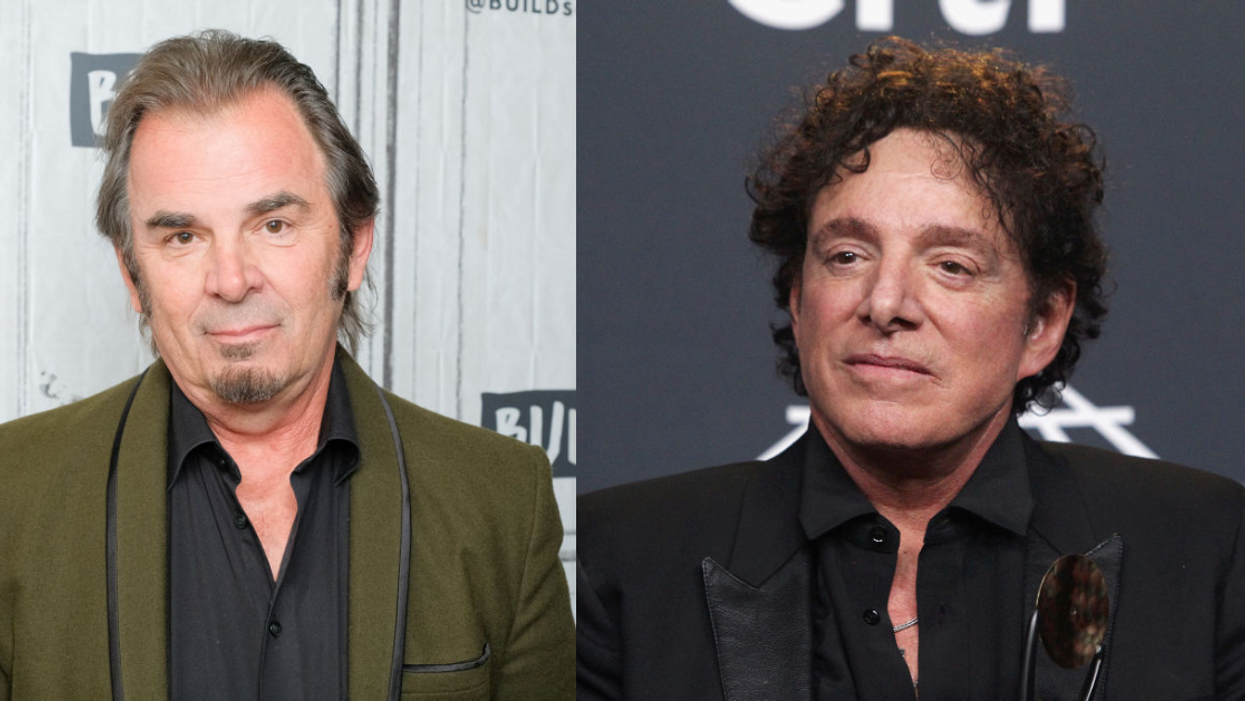Musician Jonathan Cain—best known as the keyboardist for the rock band Journey—was hit with a cease-and-desist order by an attorney for bandmate Neal Schon after performing Journey's hit song "Don't Stop Believin'" for former Republican President Donald Trump at his Mar-a-Lago estate last month.
Cain—who is married to Trump's spiritual adviser Paula White—drew criticism after performing the song with a "backing chorus" that included Georgia Republican Representative Marjorie Taylor Greene; Donald Trump Jr.'s girlfriend, the conservative news personality Kimberly Guilfoyle; and Kari Lake, who recently lost Arizona's gubernatorial race.
You can see a clip of the performance below.
Cain, Schon and estranged singer Steve Perry wrote the hit song in 1981 and it's clear, based on the letter which was obtained by Variety, that Schon does not want the song—perhaps the most recognizable element of Journey's legacy—to be used for political purposes.
The letter reads, in part:
"Although Mr. Cain is free to express his personal beliefs and associations, when he does that on behalf of Journey or for the band, such conduct is extremely deleterious to the Journey brand as it polarizes the band’s fans and outreach. Journey is not, and should not be, political."
“Mr. Cain has no right to use Journey for politics. His politics should be his own personal business. He should not be capitalizing on Journey’s brand to promote his personal political or religious agenda to the detriment of the band."
Cain and Schon have a highly contentious relationship, most recently after Schon said in a legal filing that he had been denied access to the band's American Express card and its records. Cain's attorney, meanwhile, said Schon’s access to the corporate account had to be revoked after he allegedly put more than $1 million in “improper personal expenses” on the card.
An inside source told Variety that Cain and Schon "haven’t been getting along for a while now" and that the issue with the song has only inflamed hostilities. A spokesman for Cain hit back at Schon, saying he is "just frustrated that he keeps losing in court and is now falsely claiming the song has been used at political rallies.”
Schon, however, has said that he does not want Journey's music to be used for political purposes by either side of the aisle and that he "had to fight this whole time to protect the brand I built with Steve Perry" before he and former bandmate Gregg Rolie picked Cain to replace Rolie when he wanted to pursue other projects.
Many have criticized Cain and applauded Schon for serving the cease-and-desist letter to his longtime bandmate.
The legal battle between the two Journey bandmates is far from the first time that Trump has been at the center of disputes involving his use of certain songs during his campaign rallies.
Last month, filmmaker Duncan Jones—the son of the late rocker David Bowie—said he thinks Trump is playing his father's music during campaign events "to wind me up, pointing to Trump's decision to Bowie's song "Heroes" during his recent 2024 presidential campaign announcement.
In 2020, Trump was called out by the estate of the late rocker Tom Petty for using the song "I Won't Back Down" to promote his second presidential campaign.
At the time, Petty's estate said Petty—who made no secret of his progressive politics when he was alive—would have disapproved of Trump's use of the song, saying Trump "was in no way authorized" to use it "to further a campaign that leaves too many Americans and common sense behind."
Other artists—including Aerosmith's Steven Tyler, Elton John, and Adele—have complained about Trump using their songs during his campaign events, a point of contention for them as they don't identify with and don't want to be perceived as promoting Trumpian politics.








 The Benny Show
The Benny Show





 @neilforreal/Bluesky
@neilforreal/Bluesky @savannahcat/Bluesky
@savannahcat/Bluesky @qadishtujessica.inanna.app
@qadishtujessica.inanna.app @v-ron/Bluesky
@v-ron/Bluesky @nelnelnellie/Bluesky
@nelnelnellie/Bluesky @beatlenumber9/Bluesky
@beatlenumber9/Bluesky @pinkzombierose/Bluesky
@pinkzombierose/Bluesky
 @theunobsolete/TikTok
@theunobsolete/TikTok @theunobsolete/TikTok
@theunobsolete/TikTok @theunobsolete/TikTok
@theunobsolete/TikTok @theunobsolete/TikTok
@theunobsolete/TikTok @theunobsolete/TikTok
@theunobsolete/TikTok @theunobsolete/TikTok
@theunobsolete/TikTok @theunobsolete/TikTok
@theunobsolete/TikTok @theunobsolete/TikTok
@theunobsolete/TikTok @theunobsolete/TikTok
@theunobsolete/TikTok @theunobsolete/TikTok
@theunobsolete/TikTok @theunobsolete/TikTok
@theunobsolete/TikTok @theunobsolete/TikTok
@theunobsolete/TikTok @theunobsolete/TikTok
@theunobsolete/TikTok @theunobsolete/TikTok
@theunobsolete/TikTok @theunobsolete/TikTok
@theunobsolete/TikTok @theunobsolete/TikTok
@theunobsolete/TikTok @theunobsolete/TikTok
@theunobsolete/TikTok
 @laysuperstar/TikTok
@laysuperstar/TikTok @laysuperstar/TikTok
@laysuperstar/TikTok @laysuperstar/TikTok
@laysuperstar/TikTok @laysuperstar/TikTok
@laysuperstar/TikTok @laysuperstar/TikTok
@laysuperstar/TikTok @laysuperstar/TikTok
@laysuperstar/TikTok @laysuperstar/TikTok
@laysuperstar/TikTok @laysuperstar/TikTok
@laysuperstar/TikTok @laysuperstar/TikTok
@laysuperstar/TikTok @laysuperstar/TikTok
@laysuperstar/TikTok @laysuperstar/TikTok
@laysuperstar/TikTok @laysuperstar/TikTok
@laysuperstar/TikTok @laysuperstar/TikTok
@laysuperstar/TikTok @laysuperstar/TikTok
@laysuperstar/TikTok @laysuperstar/TikTok
@laysuperstar/TikTok